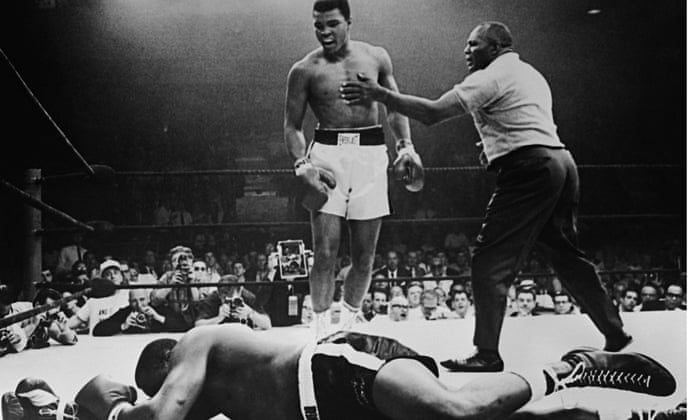The movie One Night in Miami commemorates the night Cassius Clay, soon to be known as Muhammad Ali, proclaimed himself “The Greatest” after defeating the fierce and formidable Sonny Liston in a legendary heavyweight fight. It imagines the conversations that might have taken place among Clay, Jim Brown, Sam Cooke, and Malcolm X, who met in a hotel room after the fight.
It happened on February 25, 1964, and I remember that night well.
I was seated in the auditorium at St. Francis High School in La Cañada, where William Pickering, an eminent rocket scientist at the nearby Jet Propulsion Laboratory (JPL), was the featured speaker at a banquet for academically inclined students. Don’t ask me to recall anything he said. I can report that a cheer broke out during his talk.
One of my classmates, an English whiz named Rich, brought a transistor radio into the room. He concealed it under a tablecloth and set the volume at the lowest setting. Periodically bending over, he was able to follow the progress of the Clay-Liston bout, while Pickering extolled the virtues of unmanned space exploration. At the start of the seventh round, Rich heard Howard Cosell announce, “Sonny Liston is not coming out!… The winner and the new heavyweight champion of the world is Cassius Clay!” Rich spread the word at our table, which prompted an outburst that might have made Pickering wonder what he’d said to impress us.
Get the top stories in your inbox by signing up for our daily newsletter, Indy Today.
In the 57 years since then, I became a sportswriter, Rich taught literature at a girls’ Catholic high school, and Muhammad Ali achieved fame as the greatest athlete of our generation.
Pickering earned several honors in his field. He was inducted into the International Space Hall of Fame in 1980, three days after Ali went into the ring at age 38 and flamed out sadly against Larry Holmes. But when he ignited the Olympic flame at Atlanta in 1996, Ali had garnered worldwide admiration that transcended sports.
The legacy of William Pickering, who died in 2004, came to life last week when JPL scientists — no longer an exclusively male congregation — brilliantly masterminded the landing of Perseverance on Mars. When the rover’s touchdown was confirmed, the brainiacs in the control room lustily applauded and cheered like the fans who would be watching games at UCSB or Westmont College if they were not banned by COVID precautions.
Note: You can find livestreaming videos of the Gauchos, including their nationally ranked baseball team, and the Warriors at ucsbgauchos.com and athletics.westmont.edu.
Back to that night in Miami, Jim Brown is the only surviving member of the featured foursome. I was 12 when I watched the Cleveland Browns star slash through the L.A. Rams defense for 171 yards in a 1958 game. He appeared to be bigger than linemen. I never saw a more powerful display of running the football.
Which brings me to the already booming necrology of 2021. It starts with a pair of running backs.
Floyd Little wore the same No. 44 at Syracuse as Brown and Ernie Davis, a Heisman Trophy winner whose life was cut short by leukemia, and the 44 he wore for the Denver Broncos was retired by the club. Little was a sweet guy who lived in Santa Barbara for a while when he owned a car dealership here. He died on January 1 at 78 in Nevada.
Jaguar Jon Arnett, who once roamed the turf at the L.A. Coliseum, died on January 16 at 85. He was a shifty, elusive runner for the USC Trojans and the Rams.
Baseball’s Hall of Fame took a big hit last month, losing Tommy Lasorda, Don Sutton, and Hank Aaron. Lasorda devoted his life to the Dodgers and baseball, spreading the good news all over the land, including Santa Barbara several times when he helped raise funds for UCSB’s program. Sutton got his start in professional baseball in 1965 with the erstwhile Santa Barbara Dodgers, a Single-A club, and he went on to a 23-year major league pitching career. Aaron picked up where Jackie Robinson left off, fighting prejudice with absolute dignity, and he became one of the greatest, if not the greatest, of all time.
It would be remiss for me not to mention another running back, Tom Broadhead, a UCSB Hall of Famer. Known as the Camarillo Comet, he became the all-time leading Gaucho rusher in 1967 and ’68. Long after the school dropped football, he enjoyed reunions with his old teammates. Broadhead kept coming even when he was afflicted with cancer that left him, in his words, with “more bags, pouches, and organs attached to my outer body than there are within.” He died last April in Texas.
That movie sent me quite far down memory lane. The road has been breaking up in obits and pieces.
Every day, the staff of the Santa Barbara Independent works hard to sort out truth from rumor and keep you informed of what’s happening across the entire Santa Barbara community. Now there’s a way to directly enable these efforts. Support the Independent by making a direct contribution or with a subscription to Indy+.

